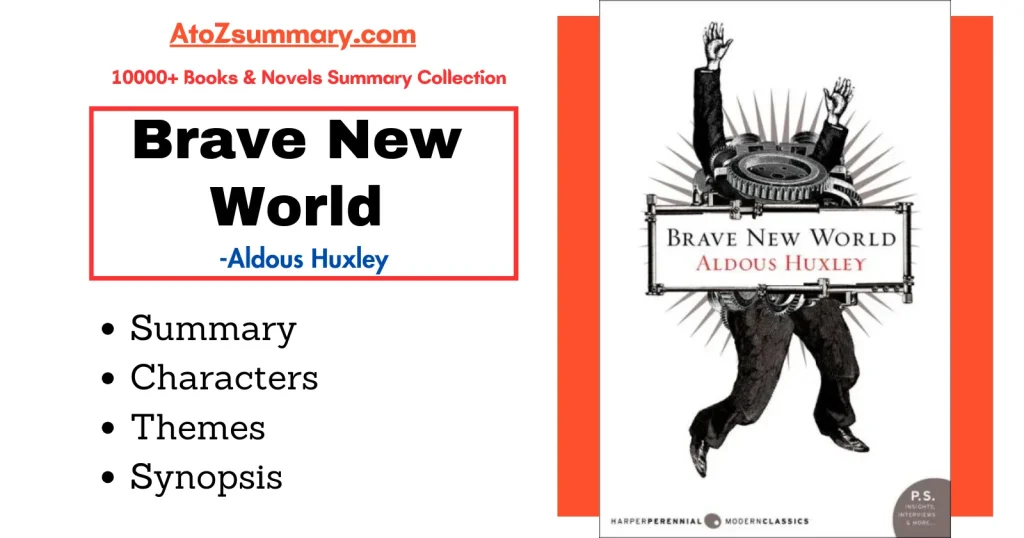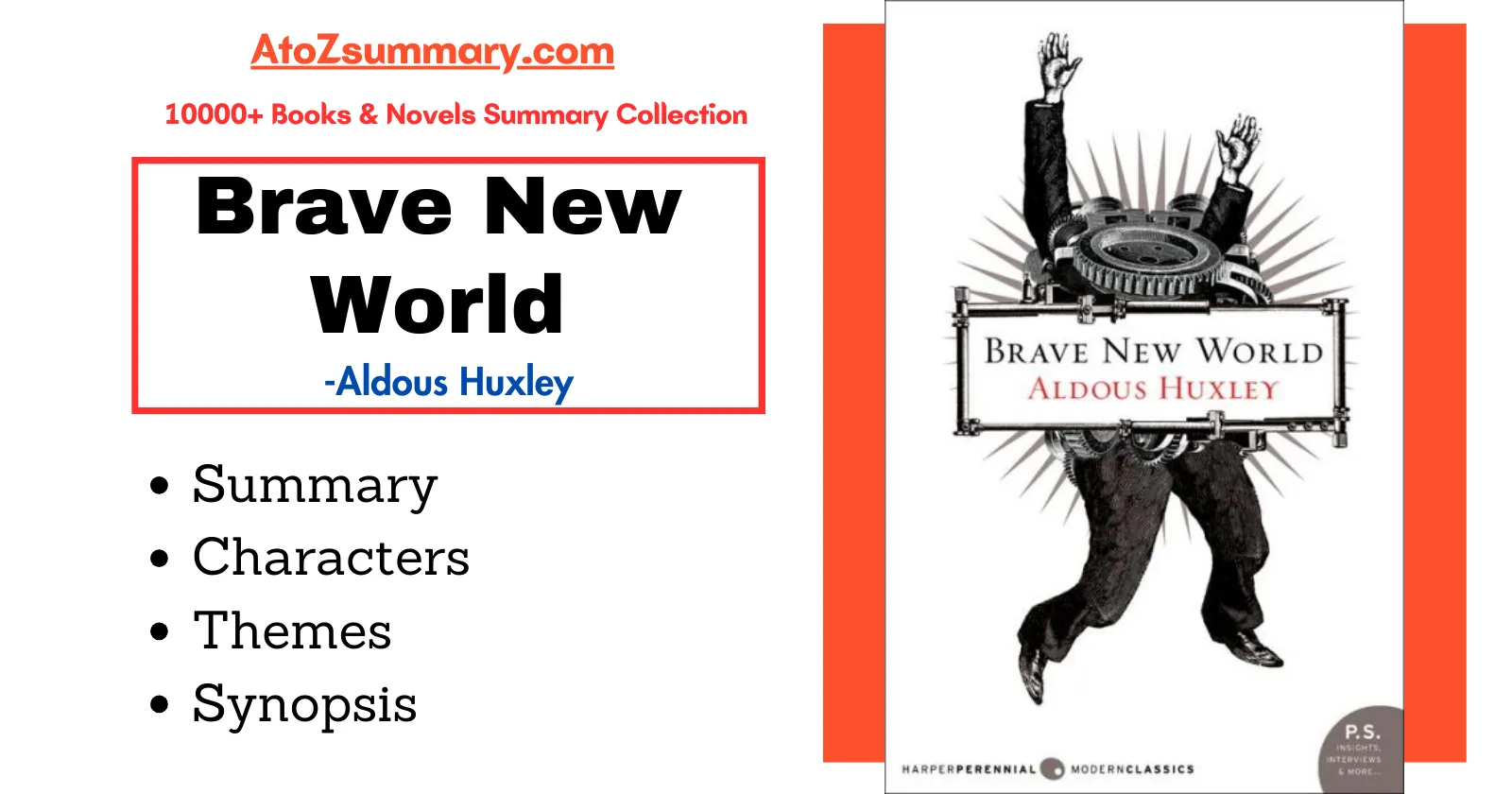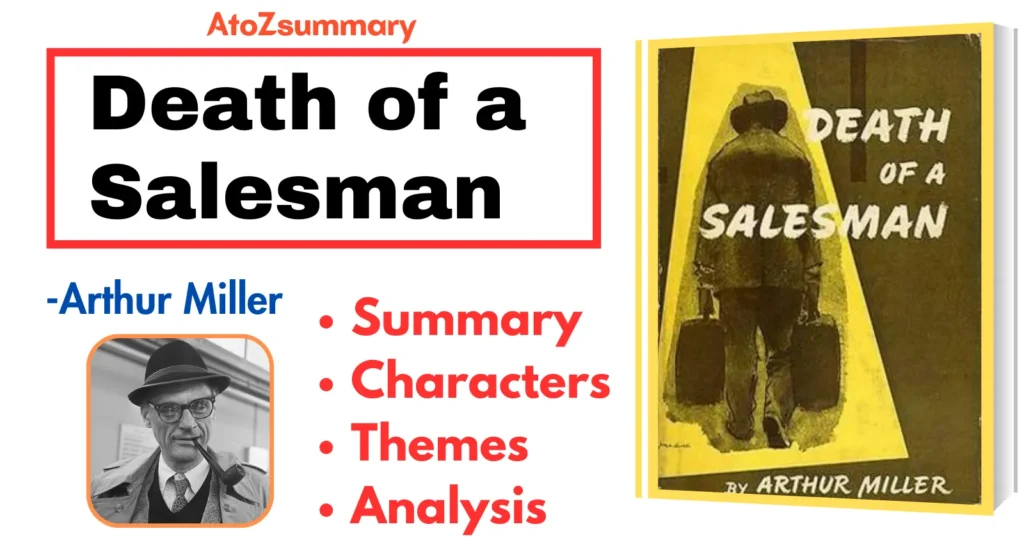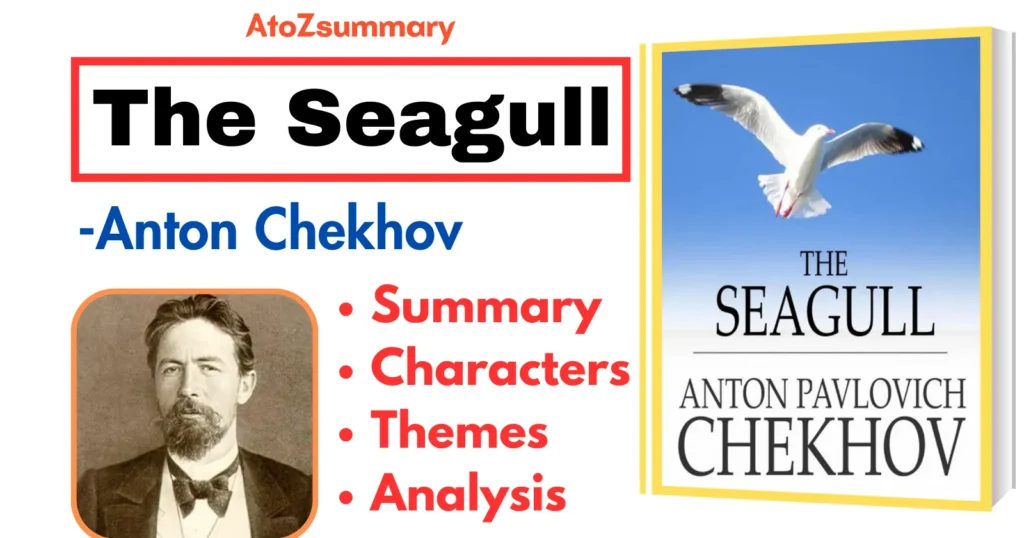
| Title | Brave New World |
| Author | Aldous Huxley |
| No. of pages | 288 pages |
| Langugage | English |
| Publisher | Chatto & Windus |
| Publication Year | 1932 |
| Genre | Dystopian Science Fiction |
| Setting | A futuristic World State |
Characters
The main characters of “Brave New World” by Aldous Huxley are:
- Bernard Marx – A man who feels different from others in the society and questions its rules.
- Lenina Crowne – A woman who follows the society’s norms but becomes curious about different ways of life.
- Mustapha Mond – A leader who enforces the society’s rules and controls knowledge.
- John “the Savage” – A man from outside the society who challenges its values and beliefs.
- Helmholtz Watson – A talented writer who also questions the society’s restrictions.
Themes
The themes of “Brave New World” by Aldous Huxley are:
- Totalitarianism – The novel explores a society where the government has total control over people’s lives.
- Loss of Individuality – It shows how people are conditioned to conform and lose their unique identities.
- Technological Control – The society relies on technology to manipulate and control its citizens.
- Consumerism – People are obsessed with materialism and instant gratification.
- Pursuit of Happiness – The society prioritizes pleasure and happiness above all else, often at the expense of deeper meaning.
Synopsis
In a society where people are genetically modified, socialized from birth, and under government control, Bernard Marx begins to question societal norms and values.
He meets John, a “savage” from outside the World State, and together they rebel against the rigid social order and the use of the happy-making drug soma.
The novel explores issues like conformity, freedom, individuality, and the effects of a technologically advanced, dehumanized society.
Watch Full Novel Summary
Summary
The novel begins with a group of lads being given a tour of the Central London Hatching and Conditioning Centre by the Director of the Hatchery and Henry Foster, one of his helpers. The Bokanovsky and Podsnap Processes, which the Hatchery uses to create hundreds of essentially identical human embryos, are explained to the lads. Alpha, Beta, Gamma, Delta, or Epsilon are the five castes that the embryos are trained to belong to as they move around the building on a conveyor belt in bottles during the gestation period.
The Alpha embryos will grow up to be the rulers and intellectuals of the World State. Each caste that follows is trained to be a little less spectacular, both physically and mentally. The Epsilons are doomed to do menial work since they have been stunted & stupefied by oxygen deprivation and chemical treatments. A worker at the facility named Lenina Crowne explains to the lads how she immunizes embryos intended for warm areas.
After that, the Director takes the lads to the nursery, where they see a bunch of Delta newborns being taught to detest reading and flowers. The Director argues that this programming contributes to Deltas being enthusiastic and submissive customers. Then he explains to the lads how the World State teaches youngsters its morals using “hypnopaedic” (sleep-teaching) methods. A whispering voice is heard reciting a lesson in “Elementary Class Consciousness” in a room where bigger kids are taking naps.
The director takes the guys outside where they see hundreds of nude kids playing sexual games like “Centrifugal Bumble-puppy.” One of the ten World Controllers, Mustapha Mond, presents himself to the boys and starts to give them a history of the World State, emphasizing its accomplishments in eradicating strong emotions, wants, and interpersonal ties. Lenina and Fanny Crowne converse about their connection with Henry Foster in the Hatchery’s restroom. When Fanny reprimands Lenina for dating Henry nearly exclusively for four months, Lenina acknowledges that she has feelings for the odd, somewhat comical-appearing Bernard Marx. When Bernard overhears Henry & the Assistant Predestinator discussing “having” Lenina in another area of the Hatchery, he becomes furious.
Lenina informs Bernard that she would be delighted to go with him on the excursion to the Savage Reservation in New Mexico that he had asked her to after work. Overjoyed yet ashamed, Bernard takes a chopper to see Helmholtz Watson, a friend of his. He talks about his displeasure with the World State with Helmholtz. Helmholtz is unhappy because he is too brilliant for his work producing hypnopaedic words, whereas Bernard is more unhappy. After all, he is too little and weak for his caste. Bernard approaches the Director, his immediate boss, and requests authorization to go to the Reservation. The director begins by telling a tale of a trip he took to the reservation twenty years previously with a woman.
He explains to Bernard that the woman got lost during a storm and was never found. Bernard receives the permit from him at that point, and he then sends Lenina and himself off to the Reservation, where they obtain a second permit from the Warden. Before entering the Reservation, Bernard makes a call to Helmholtz, who informs him that the Director intends to banish Bernard to Iceland when he returns because he has grown tired of what he perceives to be Bernard’s challenging and unsociable conduct. Despite his distress and anger, Bernard decides to enter the Reservation.
Both Lenina and Bernard are astonished to find elderly and ailing people living on the Reservation because there are no apparent symptoms of aging in the World State. They see a young guy being beaten as part of a religious ceremony and find it repugnant. Following the rite, they see John, a young guy with a fair complexion who lives alone in the village. Bernard learns of John’s upbringing as the son of Linda, a woman who was saved by the villagers twenty years before.
Bernard understands that the woman the Director was referring to is most likely Linda. Speaking with John, he discovers that Linda was shunned for being ready to have sex with every man in the community, and as a result, John was reared apart from the rest of the community. John reveals that he learned to read using two books: The Complete Works of Shakespeare, which was given to Linda by one of her boyfriends, Popé, and The Chemical & Bacteriological Conditioning of the Embryo. John expresses to Bernard his desire to see the “Other Place”—the “brave new world” that his mother has frequently described to him. He is given the chance to travel back to the World State alongside Bernard. John concurs but demands that Linda be permitted to go as well.
Lenina, who is fed up with the Reservation, takes enough soma to put her to sleep for eighteen hours, and Bernard, who is flying to Santa Fe, phones Mustapha Mond and gets the go-ahead to return John and Linda to the World State. In the meantime, John enters the home where Lenina is found asleep and inebriated and struggles to control his want to touch her. Flying to the World State, where the Director is ready to exile Bernard in front of his Alpha coworkers, Bernard, Lenina, John, and Linda arrive. Bernard, however, flips the script by introducing John and Linda. The Director resigns due to his embarrassment about becoming a “father”—the term alone evokes uneasy laughter from bystanders—allowing Bernard to stay in London.
John’s peculiar life on the Reservation makes him popular among the London elite. But when John visits the World State’s industries and schools, he is more and more horrified by the civilization he encounters. Lenina continues to pique his sexual interest, but he is puzzled since he wants more than just lust. Lenina becomes perplexed as a result, and she questions John’s reasons for not wanting to have sexual relations with her. Bernard gains popularity as the “Savage’s” discoverer and protector.
He rapidly takes advantage of his newfound prominence by having affairs with several women and arranging dinner parties for prominent people, most of whom despise Bernard but are prepared to appease him in exchange for the chance to meet John. Bernard’s social position declines when John declines to greet the visitors, which includes the Arch-Community Songster, one evening.
Bernard introduces John and Helmholtz, and they hit it off right away. John reads sections of Romeo and Juliet to Helmholtz, but at a serious chapter about love, marriage, & parents—ideas that are absurd and almost scatological in World State culture—Helmholtz cannot but chuckle.
Lenina becomes fixated on John as a result of Henry’s odd conduct and declines his offer to go see a feely. She takes soma & goes to see John at Bernard’s flat to make love to him. However, John retaliates to her advances with Shakespearean quotes, punches, and profanity. She withdraws to the restroom as he answers a phone call informing him that Linda, who has been on a soma holiday ever since her homecoming, is going to pass away. He watches her die at the Hospital for the Dying while several lower-caste lads undergoing “death conditioning” ponder why she is so repulsive.
The guys are only being curious, but John becomes angry. John encounters a bunch of Delta clones after Linda passes away when they are collecting their soma ration. By throwing the soma out the window in an attempt to incite them to revolt, he sparks a disturbance. When they learn of the riot, Bernard and Helmholtz hurry to the area and help John. John, Helmholtz, and Bernard are taken into custody and transported to Mustapha Mond’s office after the unrest is subdued by the use of soma vapor by the police.
John and Mond argue on the worth of the policies of the World State, with John claiming that they dehumanize its citizens and Mond asserting that stability and happiness are more significant than humanity. Art, science, and religion have all had to be sacrificed for societal stability, according to Mond. John argues that life is not worth living without these things. When Mond informs Bernard that he and Helmholtz will be sent to far-off islands, Bernard reacts violently and is removed from the room. Helmholtz happily accepts the banishment since he believes it will give him time to write, and he leaves the room when Bernard does not long after. John and Mond carry on their discussion. They talk about soma’s usage to maintain social peace and regulate unpleasant emotions.
Helmholtz and Bernard are bid farewell by John. He escapes to a lighthouse in the countryside where he gardens and makes an effort to purify himself by self-flagellation when Mond declines the option of accompanying them to the islands. Soon after, curious World State residents catch him in the act, and news crews swarm the lighthouse to record feelies and news stories. Many people arrive at the lighthouse after the feely and demand that John whip himself. Lenina walks over to John and extends her arms. In response, John waves his whip and cries, “Kill it! Kill it!” John participates in an orgy that is brought on by the intensity of the scenario. He hangs himself the next morning after being overtaken with rage and grief about his subjection to world-state culture.
FAQs
What is the main message of Brave New World?
The main message of “Brave New World” is a warning about the dangers of sacrificing individuality and freedom for a society that prioritizes conformity, pleasure, and technological control.
Is Brave New World hard to understand?
Brave New World” can be challenging to understand due to its complex themes and ideas, but it’s worth reading with some patience.
What are the main conflicts in the novel Brave New World?
The main conflicts in the novel are:
1. Individual vs. Society
2. Freedom vs. Control
3. Technology vs. Humanity
What does Brave New World teach us about happiness?
“Brave New World” teaches us that happiness can be shallow when it’s forced or manufactured, and true happiness often comes from individuality, freedom, and meaningful connections rather than superficial pleasures.
What is the truth and happiness in Brave New World?
In “Brave New World,” truth is sacrificed for happiness. The society values a superficial, controlled happiness achieved through conditioning and a drug called soma.
What is ironic about the motto in Brave New World?
The motto in “Brave New World” is “Community, Identity, Stability”. The irony is that it promotes conformity and control over individuality and freedom.
About the Author-Aldous Huxley

| Name | Aldous Huxley |
| Birth Date | July 26, 1894 |
| Death Date | November 22, 1963 |
| Nationality | British-American |
| Genre | Novels, Essays, Short Stories |
| Famous Works | Brave New World (1932) The Doors of Perception (1954) Island (1962) |










![The Catcher In The Rye Summary, Themes & Characters [by J. D. Salinger] The Catcher In The Rye Summary, Themes & Characters [by J. D. Salinger]](https://atozsummary.com/wp-content/uploads/2023/06/The-Catcher-In-The-Rye-Summary-Themes-Characters-by-J.-D.-Salinger.webp)
